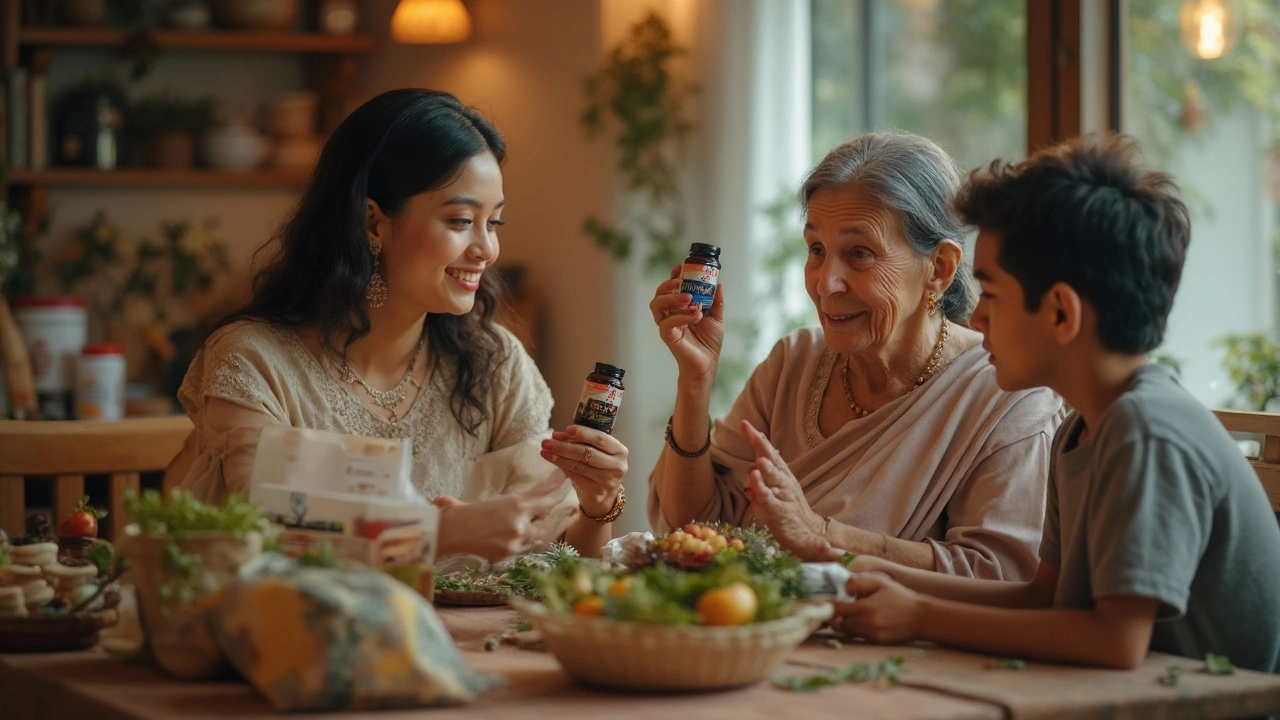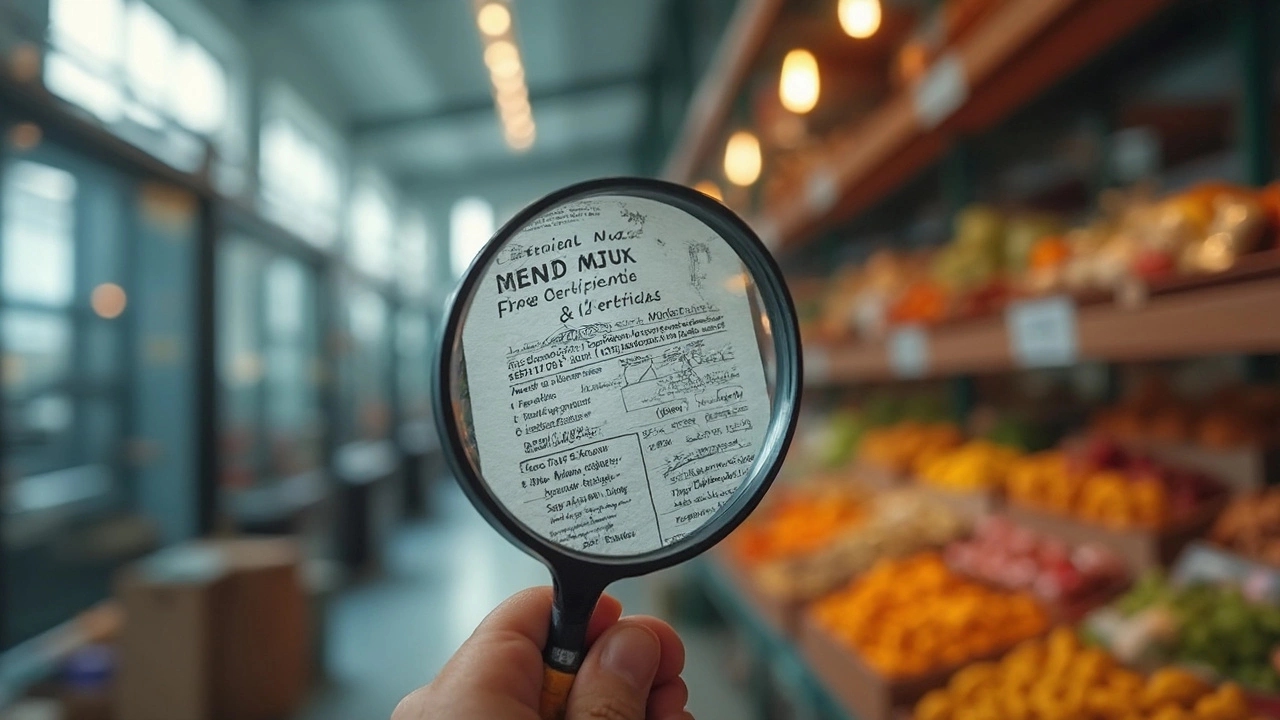
- Jun, 9 2025
- 0
The herbal supplement aisle can be a total maze. Every bottle claims miracles, but only a handful of brands actually live up to their promises. If you’ve ever stood in the store Googling whether a brand is legit, you’re not alone.
So, how do you know which companies are actually worth your trust and money? The answer isn’t all that obvious, but knowing what to look for can save you a lot of headaches—and wasted cash. It goes way beyond just the pretty label or who has the loudest ad campaign. The real answer comes down to the company’s reputation, their quality controls, and how transparent they are with what’s inside those capsules.
With herbal supplements, there’s no strict government watchdog checking if brands really put in what they say, or if the pills even work. That puts a lot of pressure on you, the buyer, to do some detective work. But there are clear signs that separate the best from the rest, and I’ll break them down in a way that actually makes sense.
- Why Reputation Matters in Herbal Supplements
- How to Spot a Trustworthy Herbal Supplement Brand
- Industry Secrets: What Top Brands Do Differently
- Popular Reputable Herbal Supplement Companies
- Tips for Choosing the Right Brand for You
Why Reputation Matters in Herbal Supplements
Bottle after bottle, the same question pops up: Can I really trust what’s inside? In the world of herbal supplements, reputation isn't just a nice bonus—it's your safety net. Since herbal products aren’t screened as intensely as prescription meds, not every company sticks to the same quality rules. Fakes and underdosed supplements are out there, sometimes with bogus claims or even hidden chemicals.
There’s been some jaw-dropping studies on this problem. In 2015, a lab at the University of Guelph tested 44 popular herbal products sold in North America. Shockingly, one-third didn’t contain what the label advertised, and some were filled out with plain rice or wheat. When you’re buying for your health, that’s a pretty scary stat.
| Product Tested | Contained Labeled Herb | Contained Fillers/Contaminants |
|---|---|---|
| 44 total | ~48% | ~33% |
Reputation matters big time because trustworthy brands are way less likely to cut corners. The top companies will:
- Use third-party labs to test purity and potency (think NSF, USP, or ConsumerLab logos).
- Share where their herbs are sourced.
- Give you easy access to test results and clear batch numbers.
- Offer customer support you can actually reach.
The FDA in the U.S. does take action when major problems come up, but it’s after the fact—usually after someone complains or gets sick. That makes brand reputation practically your only guardrail. A company that’s been around for years, gets good word-of-mouth, and shows all their cards about what’s in the bottle is way safer than the no-name brand with a fancy label on Amazon.
Bottom line: A good name in the supplement world is worth more than the herbal mix itself. Stick with brands that care about their reputation. It means they care about your health, too.
How to Spot a Trustworthy Herbal Supplement Brand
If you're serious about gaining real benefits from herbal supplements, you can’t just grab any brand off the shelf and hope for the best. There are real differences between the shady companies and the ones you can actually trust. Here’s how you spot the difference, without needing a PhD in nutrition.
First, check if the company uses third-party testing. That means a totally separate lab checks the contents, not just the company’s own word. For example, seals from NSF International, USP (U.S. Pharmacopeia), or ConsumerLab are solid proof. No seal? Huge red flag.
Next, the ingredient list should be detailed and not read like a mystery novel. Trusted brands clearly list every herb, the standardization (like 'curcumin 95%'), and where those herbs are sourced. They won’t just say “proprietary blend” and hide the amounts. Look for real numbers and specifics.
Money-back guarantees are another sign that the company stands by their stuff. Shady brands? They almost never offer refunds. Reliable ones make it easy to get your cash back if you’re not happy.
Want to dig deeper? Here are the practical things you should check before buying:
- Third-party certification/seals on the label
- Full ingredient disclosure with exact dosages, not just “blend”
- Clear info about sourcing—look for “grown in USA/EU/Canada” vs. “Product of China” (unless they back it with strong testing)
- Legit website with real contact info and customer support
- Money-back or satisfaction guarantee
- Readable batch/lot numbers for traceability
Check out this quick table showing features that top supplement companies usually have, and the riskier ones often lack:
| Feature | Good Brands | Sketchy Brands |
|---|---|---|
| Third-Party Testing Seal | Yes | Rarely |
| Clear Dosage Info | Always | Vague/absent |
| Sourcing Transparency | Always | Usually hidden |
| Refund Policy | Yes | Rare |
| Batch/Lot Numbers | Every bottle | Usually missing |
Take five minutes to check these before picking a bottle. Doing this helps you dodge a lot of fake claims and sketchy standards. Herbal supplements aren’t cheap—so make every one count.

Industry Secrets: What Top Brands Do Differently
The best herbal supplement companies don’t just survive on hype—they build trust with high standards and real transparency. It’s not just talk; these brands sink time and money into stuff you can actually check up on.
Here’s what separates leaders from copycats:
- Third-party testing is a must. Top brands always use independent labs to test for purity and potency. No shortcuts here. Look for companies that post their test results on their websites or include a QR code on the bottle.
- Ingredient sourcing matters. The best companies track exactly where their herbs come from. Stuff like organic sourcing, wildcrafted herbs, and fair-trade policies show they care about more than just selling pills.
- Real transparency. Reputable brands list everything on the label—no secret “proprietary blends” or sneaky undisclosed fillers.
- Certifications and seals. If you see NSF, USDA Organic, Non-GMO Project Verified, or GMP (Good Manufacturing Practice) certified on the label, that’s a reliable sign. These aren’t just stickers; they show a company went through regular, tough inspections.
- Solid customer support. The best brands answer questions, admit mistakes, and deal with refunds fast. They usually have nutritionists or herbalists you can actually talk to.
This isn’t just talk—here’s a snapshot of what real-world quality control looks like with some popular brands:
| Brand | Third-party Tested | USDA Organic Certified | Full Label Transparency |
|---|---|---|---|
| Gaia Herbs | Yes | Yes | Yes |
| NOW Foods | Yes | Some products | Yes |
| Nature’s Way | Yes | No | Yes |
| Solaray | Yes | No | Yes |
One more thing: the best brands update their formulas when new research comes out. They aren’t stuck in the past. For example, several switched their turmeric supplements to include black pepper extract after studies showed it helps your body absorb more curcumin—the active compound.
If you want to spot the herbal supplements companies that really stand out, hunt for details like these. These brands put in the work instead of just slapping a fancy label on a bottle. That makes a real-world difference in what you’re actually getting for your money.
Popular Reputable Herbal Supplement Companies
Trying to figure out which herbal supplement brands are truly trustworthy? A few companies pop up over and over again when health pros and regular users talk about quality and safety. Here's a breakdown you can actually use, not just a list of big names.
Herbal supplements get a lot of hype, but these companies take extra steps to actually prove what's in the bottle:
- Gaia Herbs - Famous for transparency, these guys put a tracking code on every product. You hop onto their site, enter the code, and see exactly where it was grown and what tests it passed. Their farms are in North Carolina, and they run their own labs—no outsourcing the tough stuff.
- Nature's Way - Easily one of the most well-known brands worldwide. They’ve got certifications for GMP (Good Manufacturing Practices) and even get regularly checked by third-party labs. They also carry the TRU-ID certification, which means their plant ingredients are DNA-tested for authenticity. Fewer fakes, more peace of mind.
- NOW Foods - Their herbal supplements go through strict third-party testing before they hit the shelves. They display these results online, and customers give them high marks for quality. NOW also avoids funky fillers, so you get more of what you actually want.
- Solaray - These folks have been around since the 1970s and are all about combining herbs with science. Their products show the exact amount of herb per capsule—a simple thing, but not every company bothers. If you’re after specific dosages, they make it easy.
- Herb Pharm - They focus on liquid herbal extracts and grow their own herbs in certified organic fields in Oregon. Herb Pharm is well-liked by herbalists and holistic doctors for being super picky about raw material quality.
A few signs set these brands apart in real life:
- They publish lab results and product testing info online so you can check for yourself.
- Most have third-party certifications (like NSF, USP, or TRU-ID), which means some outside lab keeps them honest.
- They offer ways to trace the source of their herbs—no mystery mixes.
- Customer service teams that’ll actually answer questions about what’s in the product or how it’s made.
When it comes to herbal supplements, these companies aren’t perfect, but their track record is much better than most—and that means less stress for you at checkout.

Tips for Choosing the Right Brand for You
Staring at a shelf full of supplements with no idea what to grab? You’re definitely not the only one. Here’s what you actually need to pay attention to before tossing any herbal supplement into your cart.
- Herbal supplements should always show third-party testing. Look for badges from places like USP, NSF, or ConsumerLab right on the label. These groups actually check if the product has what it says and isn’t hiding anything sketchy. A legit company isn’t shy about sharing these results. If you can’t find them, that’s a red flag.
- Transparency matters. The brand should clearly list the exact herb, the part of the plant used, and the amount per serving. If you see mystery blends with no details or 'proprietary formulas,' it’s usually just a way to hide cheap fillers or low doses.
- Stick with brands that source their herbs responsibly. Reputable companies usually show off their farms, explain where the plants come from, and talk about testing for pesticides or heavy metals. Gaia Herbs and New Chapter, for example, both post origin and testing details online.
- Pay attention to recall history. If a company has had a bunch of product recalls or warnings from the FDA, steer clear. You can check the FDA's database real quick at any time.
- Check out other people’s experiences. Reading reviews on sites like Labdoor, Reddit, or even Amazon can help you spot patterns. If folks keep saying the product caused weird side effects or just didn’t work, maybe skip it.
| Brand | Third-Party Tested | Source Transparency | Recall History (Past 5 Years) |
|---|---|---|---|
| Gaia Herbs | Yes | Full website info | No recalls |
| Nature's Way | Yes | Partially transparent | One minor recall |
| NOW Foods | Yes | Full batch testing reports online | No recalls |
| Herbalife | Not always disclosed | Minimal info | Several recalls |
So, don’t just buy what pops up first on Google or Instagram. Take a second to check for certification badges, plant sourcing details, and recent recall info. If you’re down to two brands, ask your pharmacist or doctor which they trust—these folks see what actually works, not just what’s hyped. Smart choices mean safer results and way less stress later on.
Nikhil Verma
I'm a dedicated physician with a passion for exploring the intricacies of medicine, focusing on the unique healthcare challenges in India. I spend much of my spare time writing articles aimed at improving public understanding of health issues. Balancing my clinical practice and writing allows me to reach a wider audience, sharing insights and fostering a deeper appreciation for medical advancements. I derive immense satisfaction from both treating patients and engaging with readers through my writing.